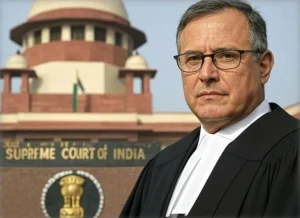Why Are Judicial Doctrines Important for UPSC?
Judicial doctrines are vital principles developed by courts to interpret laws and the Constitution. For UPSC aspirants, mastering these doctrines is essential for Polity, Mains GS Paper 2, and Essay.

This blog covers the most critical doctrines like Doctrine of Severability, Doctrine of Eclipse, Doctrine of Waiver, Doctrine of Pith and Substance, and Doctrine of Incidental and Ancillary Powers, explained with examples from landmark cases.
Doctrine of Severability
➡️ What is the Doctrine of Severability?
When part of a law is unconstitutional, the question arises — should the whole law be void or just the offending part?
According to this doctrine:
-
If the unconstitutional part can be separated from the constitutional part, only the unconstitutional part is void.
-
If not, the whole law becomes void.
Basis: Article 13 of the Indian Constitution.
Analogy: Sweater and thread — if one thread is defective, remove the thread, not the entire sweater.
➡️ Important Cases:
| Case | Key Point |
|---|---|
| AK Gopalan vs State of Madras (1950) | Section 14 of Preventive Detention Act struck down. |
| State of Bombay vs FN Balsara (1951) | 8 sections of Bombay Prohibition Act invalidated, rest upheld. |
| RMD Chamarbaugwalla vs Union of India | Only gambling competitions invalidated, skill-based allowed. |
| Kihoto Holohan Case (1992) | Para 7 of Tenth Schedule declared unconstitutional. |
Doctrine of Eclipse
➡️ What is the Doctrine of Eclipse?
-
Deals with pre-constitutional laws violating Fundamental Rights.
-
Such laws are not dead, but merely eclipsed or overshadowed.
-
These laws continue to exist for:
-
Past transactions
-
Non-citizens
-
Enforcement of pre-Constitution rights
-
If the Fundamental Right is amended later, the law becomes valid again.
➡️ Important Cases:
| Case | Key Point |
|---|---|
| Deep Chand Case (1959) | Eclipse applies only to pre-constitutional laws. |
| Mahendra Lal Jain Case (1962) | Reiterated above stance. |
| Ambica Mills Case (1974) | Extended eclipse to some post-constitutional laws affecting non-citizens. |
Doctrine of Waiver
➡️ What is the Doctrine of Waiver?
-
Refers to voluntarily giving up a known right.
-
Not applicable to Fundamental Rights in India (unlike in the USA).
-
One cannot waive Fundamental Rights or be estopped from claiming them.
➡️ Important Cases:
| Case | Key Point |
|---|---|
| Olga Tellis vs Bombay Municipal Corporation (1985) | No estoppel against Constitution; Fundamental Rights cannot be waived. |
| Behram Khurshid Pesikaka vs State of Bombay | Fundamental rights cannot be waived even in criminal prosecutions. |
Doctrine of Pith and Substance
➡️ What is the Doctrine of Pith and Substance?
-
Related to division of legislative powers between Centre and States.
-
Law must be interpreted as a whole to determine its real nature.
-
Main object and scope of the law are critical.
Analogy: Cake-shaped costume — focus on the substance, not surface.
➡️ Important Cases:
| Case | Key Point |
|---|---|
| State of Bombay vs FN Balsara (1951) | Validated Bombay Prohibition Act. |
| DN Bannerjee vs PR Mukherjee (1952) | Industrial Disputes Act valid even when affecting municipalities. |
| State of Gujarat vs Shantilal Magandas (1969) | Pith and Substance irrelevant for Fundamental Rights analysis. |
| State of UP vs Lalta Prasad Vaish and Sons (2024) | States can tax industrial alcohol. |
Doctrine of Incidental and Ancillary Powers
➡️ What is the Doctrine of Incidental and Ancillary Powers?
-
Relates to legislative distribution of powers.
-
Each power includes incidental powers necessary to execute it effectively.
-
Entries in the lists should be read broadly, not narrowly.
➡️ Key Examples:
-
Power to levy tax includes power to check tax evasion.
-
Power to regulate rent collection includes power for remission of rent.
-
Power to legislate fisheries beyond territorial waters (Union List) versus inland fisheries (State List).
⚡ However, incidental power cannot be stretched unreasonably (e.g., power to tax does not include confiscating goods).
Frequently Asked UPSC Questions on Judicial Doctrines
❓ What does the Doctrine of Severability mean in constitutional law?
Only the unconstitutional part of a law is void if it can be separated from the valid portion.
❓ Is the Doctrine of Waiver applicable to Fundamental Rights in India?
No, Fundamental Rights cannot be waived voluntarily.
❓ What is the Doctrine of Eclipse based on?
Prospective nature of Article 13(1) — laws inconsistent with Fundamental Rights are eclipsed, not dead.
❓ How does the Doctrine of Pith and Substance help in legislative interpretation?
It determines the real subject matter of a law to attribute it to the appropriate legislative list.
Conclusion
For UPSC aspirants, judicial doctrines are not just theoretical concepts but crucial tools for interpreting constitutional law, fundamental rights, and the powers of legislature. They are frequently asked in Prelims, Mains, and Interviews, often deciding the edge between a good and great answer.





